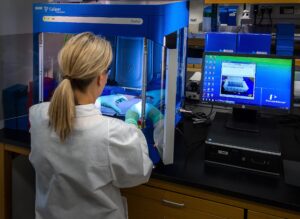
The world of technology has always been a breeding ground for innovation, pushing the boundaries of what was once considered impossible. Among the latest breakthroughs, the fifth-generation wireless technology, better known as 5G, has emerged as a transformative force. Promising lightning-fast speeds, low latency, and unprecedented connectivity, 5G is set to reshape our lives and industries in ways that were once confined to the realms of science fiction.
The Dawn of 5G: A Journey Through Generations
The evolution of wireless technology began decades ago, with the first generation (1G) paving the way for basic voice calls. As the generations progressed, so did the capabilities of mobile communication. The transition from 3G to 4G brought us mobile internet and widespread adoption of smartphones. Now, 5G is on the horizon, representing a giant leap forward in wireless connectivity.
Unveiling the Power of 5G: Breaking the Speed Barriers
At the core of 5G’s appeal lies its incredible speed. Traditional 4G networks boast speeds of up to 100 Mbps, while 5G takes it to an entirely new level, reaching up to 20 Gbps. This drastic improvement allows for almost instantaneous downloads and seamless streaming of high-definition content. With 5G, buffering and lag will become a thing of the past, revolutionizing the way we consume media and experience online entertainment.
Empowering the Internet of Things (IoT): A Connected Ecosystem
One of the most profound impacts of 5G is its role in accelerating the growth of the Internet of Things (IoT). As more devices become interconnected, 5G’s low latency and high capacity enable real-time data transfer on an unprecedented scale. This interconnected ecosystem extends beyond smartphones and computers, encompassing smart homes, autonomous vehicles, smart cities, and a plethora of IoT devices that will transform how we interact with our surroundings.

A Game-Changer for Industry: Enabling the Fourth Industrial Revolution
5G’s influence extends far beyond personal devices and entertainment. The business world stands to gain significantly from its implementation. The Fourth Industrial Revolution, characterized by the integration of digital, physical, and biological systems, is becoming a reality with 5G. Industries will experience increased efficiency, automation, and real-time data analysis, driving innovation and transforming production processes.
Telemedicine and Beyond: Healthcare at Our Fingertips
In the realm of healthcare, 5G is poised to revolutionize telemedicine. With its high-speed, low-latency capabilities, medical professionals can perform remote surgeries with enhanced precision. Moreover, patient data can be transmitted in real-time, enabling faster and more accurate diagnoses. 5G will bridge the gap between patients and healthcare providers, making quality medical care accessible to remote and underserved regions.
Smart Cities: Paving the Way to Sustainable Urban Living
5G is a key enabler of smart cities, where advanced technologies converge to create efficient, sustainable urban environments. With its ability to handle vast amounts of data from sensors and devices, 5G will optimize transportation systems, reduce energy consumption, and improve public safety. These interconnected cities will enhance the quality of life for residents while minimizing the ecological footprint of urban living.
Challenges and Concerns: Balancing Progress and Responsibility
As we embrace the potential of 5G, it’s essential to address the challenges and concerns that arise. The rollout of 5G infrastructure requires significant investment, and ensuring widespread coverage will be critical to realizing its full potential. Additionally, data privacy and security must be diligently addressed to protect users from potential vulnerabilities.
The Future of Connectivity: A World Transformed
As 5G unfolds, it brings with it a future that was once relegated to the realm of science fiction. From futuristic smart cities to advanced telemedicine, 5G’s revolutionary impact is set to permeate every aspect of our lives. Embracing this new era of connectivity while staying mindful of the ethical implications will pave the way for a truly connected world, where technology enhances human experiences and drives progress like never before.
The Green Revolution: Sustainable Innovations Shaping Our Future
- Renewable Energy: Harnessing Nature’s Abundance
- Solar Power: Tapping into the Sun’s Energy
- Wind Energy: Capturing the Power of the Wind
- Hydropower: Utilizing the Force of Water
- Electric Mobility: Driving Towards a Greener Future
- The Rise of Electric Vehicles (EVs)
- Charging Infrastructure: Fuelling the EV Revolution
- Advancements in Battery Technology
- Circular Economy: Redefining Resource Management
- Waste to Wealth: Recycling and Upcycling
- Closed-Loop Systems: Minimizing Waste Generation
- Extended Producer Responsibility (EPR)
- Smart Grids: Efficient Energy Distribution
- Building a Resilient and Adaptive Power Grid
- Decentralized Energy Generation and Distribution
- Real-Time Monitoring and Demand Response
- Green Architecture: Sustainable Building Solutions
- Net-Zero Buildings: Balancing Energy Consumption and Production
- Eco-Friendly Materials and Design Practices
- Green Roofing and Vertical Gardens
- Carbon Capture and Storage (CCS): Mitigating Emissions
- Removing CO2 from Industrial Processes
- Storing Carbon Underground: Carbon Sequestration
- Carbon Offsetting and Climate Neutrality
- Agroecology: Sustainable Farming for a Growing World
- Organic Farming: Nurturing Soil Health and Biodiversity
- Precision Agriculture: Technology-Driven Sustainable Practices
- Regenerative Farming: Restoring Ecosystems and Emissions Reduction
- Clean Water Solutions: Preserving Our Most Precious Resource
- Water Purification Technologies
- Desalination: Tapping into Seawater Resources
- Water Conservation and Efficient Usage
- Nature-Based Solutions: Restoring Ecosystem Balance
- Afforestation and Reforestation: Capturing Carbon Naturally
- Wetland Restoration: Natural Water Filtration Systems
- Biodiversity Conservation: Protecting Our Ecological Heritage
- Corporate Sustainability: Embracing Responsibility for a Greener Tomorrow
- Sustainable Business Practices and Reporting
- ESG (Environmental, Social, Governance) Principles
- Impact Investing: Supporting Sustainable Ventures
Sustainable Nanotechnology: A Microscopic Approach to Green Innovation
Nanotechnology, the science of manipulating matter at the nanoscale, is stepping into the forefront of sustainable innovation. By harnessing the unique properties of nanomaterials, researchers are developing environmentally friendly solutions across various sectors. Nanocatalysts are paving the way for more efficient and selective chemical reactions, reducing the need for harmful chemicals and minimizing waste in industrial processes. Additionally, nanosensors are revolutionizing environmental monitoring, enabling real-time detection of pollutants and providing valuable data for sustainable decision-making.
Ocean Energy: Riding the Waves towards Renewable Power
As the quest for renewable energy intensifies, ocean energy emerges as a promising frontier. Tapping into the immense power of the seas, this form of renewable energy comes in various forms. Wave energy converters capture the kinetic energy from ocean waves, while tidal energy systems harness the predictable ebb and flow of tides. Moreover, ocean thermal energy conversion utilizes the temperature difference between warm surface waters and cold depths to generate power.





